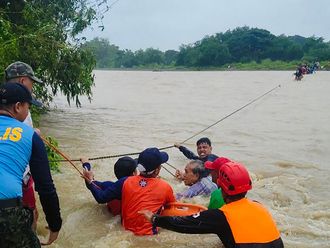Manila More people filed complaints against a woman who was arrested for illegal recruitment, prompting authorities to predict the list of failed overseas Filipino workers (OFWs) could grow longer, a senior official said.
Some 15 more complainants came to the office of the Philippine Overseas Employment Administrator (POEA) and lodged complaints against Ma. Ludina Ceniza who was arrested by the National Bureau of Investigation in Cebu, central Philippines last February 9, Labour Secretary Rosalinda Baldoz said in a TV interview.
Complainants should come forward, now that her identity has been revealed, said Baldoz.
Authorities released Ceniza after she posted a bail of P 24,000 (Dh 2,000) on February 12.
Ceniza was arrested last week because of a complaint filed by Rufina Navida, an Overseas Filipino Worker (OFW).
Fee for processing
In her complaint, Navida said the recruiter demanded a P 40,000 (Dh 3,333) processing fee, for a job in a beauty salon in Singapore last year. After Navida left for Singapore on March 2, 2011, she did not find any employer and, worse, she had no job order.
When she returned home to Cebu, Navida requested the NBI to investigate Ceniza's company, the Worldwide Academy of Tourism and Hospitality Training and Assessment Centre, and found it had no license from the Philippine Overseas Employment Administration (POEA) to recruit OFWs.
Ceniza's office, however, was attached to the Supersonic Manpower Services Corporation, a recruitment agency with POEA accreditation.
'Exorbitant fees'
The same company was formerly accredited by the Technical Education and Skilled Development Authority (TESDA), allowing Ceniza to ask for exorbitant fees for some successful deployment of OFWs to Canada and Singapore.
A complaint was filed earlier against Ceniza in August 2011, but she managed to elude arrest because of alleged protection from unnamed personnel of the Bureau of Immigration.
With the help of local government officials, regional labour directors have already reactivated task forces to run after illegal recruiters, said the labour secretary.
"Our goal is to make our villages, towns, cities, and provinces free of illegal recruiters," Baldoz said.
Illegal recruiters have continued to victimize hundreds of Filipinos who seek work abroad.
About nine million OFWs representing a tenth of the country's population, send an estimated $ 18 billion to their loved ones in the Philippines every year.












